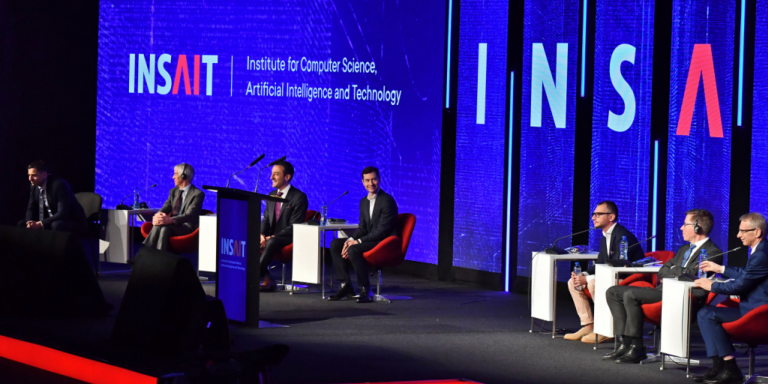
At the beginning of April, INSAIT, an institute for computer science, artificial intelligence and technology, created in partnership with the technological universities ETH Zurich and EPFL Lausanne, was launched in Sofia, Bulgaria. It will benefit from the financial support of the Bulgarian government as well as that of ETH Zurich and EPFL Lausanne, to achieve its objectives: to develop the Bulgarian scientific community, to enable, develop and retain local and international research talent, and to accelerate the impact of economic and social innovation in the region.
INSAIT was established in partnership with two of the world’s leading technological universities, with the goal of making it a leading scientific institute for computer science and AI and a research powerhouse in these rapidly growing technological fields.
Sofia is ranked among the best technology cities in Europe. Since Bulgaria joined the EU, it has attracted many foreigners due to the low cost of living and a flat personal and corporate income tax rate of 10%, the lowest in the EU. Important foreign IT companies have some of their R&D centers here (Bosch, SAP, VMWare), thus offering opportunities for research-industry interactions for INSAIT professors.
THE INSAIT
The institute will open in September 2022, and will be supervised and advised by world-renowned scientists from ETH Zurich, EPFL, IST Austria, MIT, UC Berkeley, Yale, Princeton and Technion-Institute of Technology. Its president is Martin Vechev, a native of Sofia, a graduate of the Sofia High School of Mathematics (SMG), and currently a professor of computer science at ETH Zurich where he heads the Secure, Reliable, and Inteligent Systems Lab. It is thanks to him that this institute was created.
The institute is modeled after the computer science departments of top universities such as MIT, UC Berkeley, ETH, Technion, Max-Planck, and its areas of focus include machine learning, natural language processing, computer vision, programming languages, quantum computing, computer architecture, information security, and other technology areas.
Preventing brain drain
Innovation in Eastern Europe is strongly impacted by the brain drain, with an estimated 30,000 Bulgarians leaving their country each year to study and pursue their careers in a Western country. INSAIT, the first research center in Eastern Europe, will offer world-class research environments and internationally competitive salaries, attracting foreign researchers and encouraging the best young talent to stay in the country, which will have a significant economic and social impact throughout the region.
Martin Vechev states:
“Eastern Europe is full of brilliant scientific minds – but too often people’s aspirations are limited due to lack of facilities, funding and support. This has led to a ‘brain drain’ from Eastern Europe, a systemic problem that discourages innovation. INSAIT is perfectly positioned to reverse this trend and compete on a global scale.”
He adds:
“AWS, Google, and DeepMind understand the importance of bridging the science and technology gaps between East and West to promote inclusive economic growth and recovery, democratize science, and attract top talent focused on solving some of the toughest AI challenges. We also have their support to promote diversity and inclusion in science, encouraging applications from women and other underrepresented groups in technology and science.”
Amazon Web Services will provide  3 million over three years to provide INSAIT with cloud computing resources and access to Tensor Processing Unit Research Cloud, a specialized infrastructure for running high-performance machine learning models.
3 million over three years to provide INSAIT with cloud computing resources and access to Tensor Processing Unit Research Cloud, a specialized infrastructure for running high-performance machine learning models.
Jeff Dean, Senior Fellow at Google, said:
“Google is very proud to support the work of INSAIT. Eastern Europe has an incredible talent pool of computer scientists and engineers, and we want to help INSAIT become a world-class facility, attracting the best researchers from the region and beyond. There is still much to be done in the field of AI and computer science, and initiatives like these are critical to ensuring that the technology benefits everyone. I look forward to seeing the groundbreaking work to come from NISD!”
In addition, DeepMind is investing  100M over 10 years from the Bulgarian government and a $7M investment from local companies including £6.5M from SiteGround.
100M over 10 years from the Bulgarian government and a $7M investment from local companies including £6.5M from SiteGround.
The unanimous ratification by Parliament of this international agreement between ETH Zurich, EPFL and Sofia University and the fact that scientific research in computer science is receiving public funding and support in Eastern Europe, sets a precedent for the country and the region.
Translated from Bulgarie : Lancement d’INSAIT, Institut d’informatique et de technologie, soutenu financièrement par Google, AWS et Deepmind









